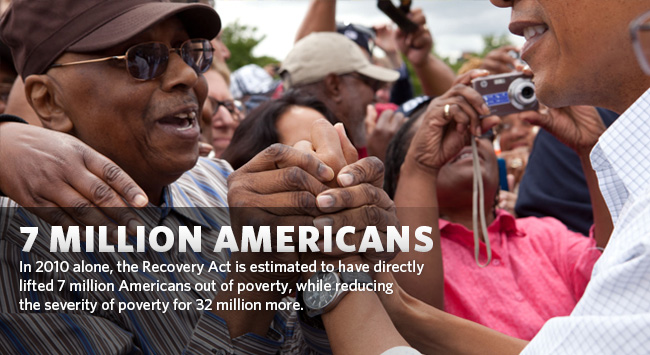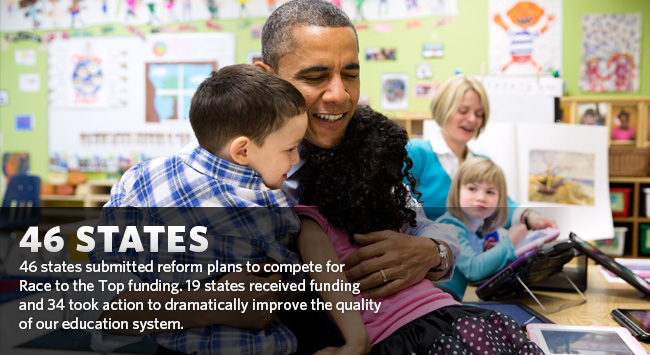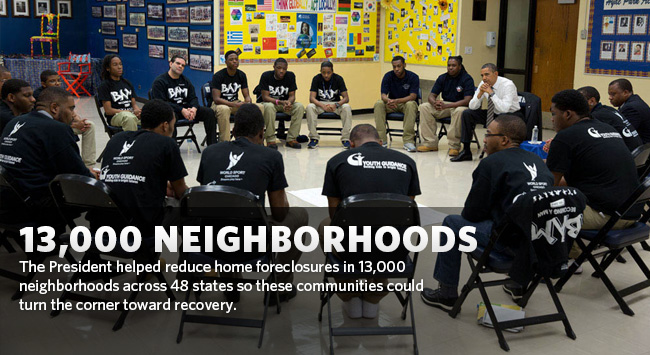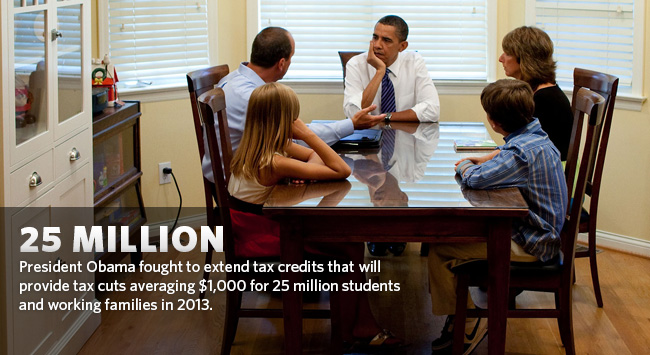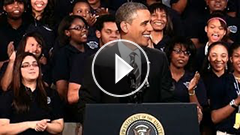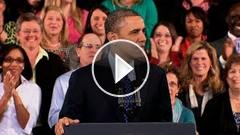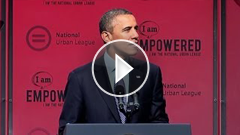Ladders of Opportunity
“We are true to our creed when a little girl born into the bleakest poverty knows that she has the same chance to succeed as anybody else, because she is an American; she is free, and she is equal, not just in the eyes of God but also in our own.”
– President Barack Obama, Inaugural Address,
January 21, 2013
Sparking Community Revitalization
A child’s zip code should never determine her destiny; but today, the neighborhood she grows up in impacts her odds of graduating high school, her health outcomes, and her lifetime economic opportunities. The President is committed to partnering with local leaders to give them tools to rebuild their communities and put people back to work. It will take a collaborative effort — between private business and federal, state, and local officials; faith-based and non-profit organizations; kids and parents—to build the good schools, safe streets, and healthy homes that every family needs.
Table of Contents
Building Promise Zones
![]()
The President’s Promise Zones will provide tools to revitalize communities by attracting private investment, creating jobs, improving affordable housing, expanding educational opportunities, providing tax incentives for hiring workers and investing within the Zones, and partnering with local leaders to navigate Federal programs and cut through red tape.
Working with local leadership and Congress, the President is proposing to invest more than $750 million in hard-hit communities to provide a tax incentive to secure private investments that will help build homes and create jobs. The Administration will also align a number of its signature revitalization initiatives from the Department of Education, the Department of Housing and Urban Development, the Department of Commerce, the Department of Health and Human Services, the Department of Justice, and the Department for Agriculture in 20 communities hardest hit by the recession, to ensure that federal programs and resources are focused intensely on these “Promise Zones”. While Congressional action is needed to reach many more communities and authorize a tax incentive that would simulate private investment, the Obama Administration intends to use all of its flexibility to designate and support at least 20 communities in the next four years.
Communities will compete in a transparent process, including demonstrating the strength and effectiveness of their local commitment to become Promise Zones.
In each Promise Zone, the federal government will make available tools like:
Promise Zone Tax Incentives
The President’s proposal includes the Promise Zones tax credit (crafted on the proven model of Empowerment Zones tax credits), that would provide private businesses tax incentives for hiring and investing in Promise Zones, to create jobs and attract additional private investments.
Strong Cities, Strong Communities / Strike Force
Through Federal teams on the ground and specialized technical assistance, these partnerships help communities break down regulatory barriers, use existing funds more effectively, and implement their economic visions.
Additional Tools
Promise Zones will be able to access investments that further the goals of job creation, additional private investment, increased economic activity, expanded educational opportunity, and reduction in violent crime. These could include the HUD Neighborhood Stabilization Program to rebuild vacant properties, and Rental Assistance Demonstration to unlock private investment in public housing. Designees will also receive competitive preference for the Administration’s signature place-based investments, including:
- Choice Neighborhoods (HUD): A redevelopment program that provides local leaders with tools to revitalize distressed public housing and concentrated poverty into vibrant, opportunity-rich neighborhoods.
- Promise Neighborhoods (ED): Based on the work of Geoffrey Canada at the Harlem Children’s Zone, Promise Neighborhoods builds a pipeline from the earliest ages of educational support services around a strong school environment, focused on the goal of high school graduation and college-going for every student.
- Byrne Criminal Justice Innovation (DOJ): Targets neighborhoods with persistent violent crime, focusing on hot spots of criminal activity, by employing cross-sector strategies that show evidence of impact in reducing violence.
Ending Homelessness
![]()
A “home” has always been at the center of the American dream. Stable housing is the foundation upon which everything else in a family’s life is built — without a safe, affordable place to live, it is much tougher to maintain good health, get a good education or reach your full potential.
Under the leadership of the Obama Administration, the U.S. Interagency Council on Homelessness released the first federal strategic plan to end homelessness. Harnessing the talents and resources of 19 different federal agencies, Opening Doors provides a road map for ending chronic and veteran homelessness by 2015 and homelessness among families, youth, and children by 2020, while setting the country on a path to eradicate all types of homelessness. In 2010, the Department of Housing and Urban Development (HUD) partnered with the Department of Veterans Affairs (VA) to establish joint goals and monitor progress in the fight to end veterans’ homelessness. Due to this partnership, HUD and the VA has reduced veterans homelessness by 18 percent in the last two years.
Bringing Healthy Foods to Local Communities
![]()
In 2010, the Obama Administration launched the Healthy Food Financing Initiative (HFFI), a partnership across various federal agencies to combat the lack of access to healthy food by provide financing for developing and equipping grocery stores, small retailers, corner stores, and farmers markets selling healthy food in underserved areas. There are currently 23.5 million Americans, including 6.5 million children, living in neighborhoods without full service grocery stores and limited access to fresh, healthy food.
In addition, in 2011, the Department of Treasury provided $25 million in grants to Community Development Financing Institutions to fund healthy food initiatives and the Treasury’s New Market Tax Credits program includes 50 companies that expect to generate $461 million for HFFI activities. The Health and Human Services Department awarded $10 million to community economic development corporations to develop grocery stores, small retailers, corner stores, farmers markets, and other innovative initiatives to help revitalize communities. And U.S. Department of Agriculture continues their work to improve access to healthy and affordable food across the nation through various agency programs.
Working with the Obama Administration, several of the nation’s food retailers and national foundations have also made commitments to bring grocery stores to communities across America. Over the next five years, more than 1,500 stores will be built or expanded and according to the organizations involved, all together their commitments will create tens of thousands of jobs and serve 9.5 million individuals.
Partnering to Create Sustainable Communities
![]()
The Partnership for Sustainable Communities initiative coordinates federal policies, programs and resources to encourage and fully assist cities, metropolitan areas and rural areas to build sustainable communities. Since 2009, the Administration has provided tools for more than 700 communities through the Partnership, with each partnership guided by six livability principles that help communities around the country develop in more environmentally and economically sustainable ways. The Partnership works to coordinate federal housing, transportation, water, and other infrastructure investments across agencies to make neighborhoods more prosperous, allow people to live closer to jobs, save households time and money through transportation options, and reduce pollution. Small towns, suburbs, cities, and entire regions are planning for sustainable communities, and many have asked the Partnership to help them turn these plans into reality.
Learn more about the Partnership for Sustainable Communities

Download Reports
Read more about the policies and initiatives that the Obama Administration has taken to help strengthen our communities.
- Creating Pathways to Opportunity
- Promoting Responsible Fatherhood
- Neighborhood Revitalization Initiative
- Federal Strategic Plan to Prevent and End Homelessness
- Partnership for Sustainable Communities
Featured Videos

We’re not a nation of people who are looking for handouts… But we do expect hard work to pay off. We do expect responsibility to be rewarded. We do expect that if you put in enough effort, you should be able to find a job that pays the bills. You should be able to own a home you call your own.... You should be able to give your kids the best possible education.

President Barack Obama
July 25, 2012
